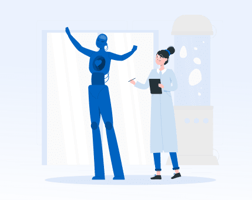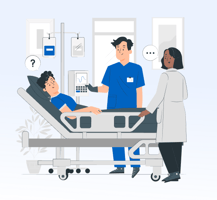The healthcare industry is undergoing a profound transformation, driven by technological...
Privacy and Security in Mental Health Apps: Ensuring User Trust
Mental health apps have become valuable tools in supporting individuals' emotional well-being and managing mental health challenges. However, the sensitive nature of mental health data makes it crucial to address privacy and security concerns effectively. In this article, we will explore the paramount importance of privacy and security in mental health apps and discuss strategies to build user trust in these digital platforms.
The Sensitivity of Mental Health Data
Mental health apps often collect highly sensitive information, including users' emotional states, therapy progress, and personal experiences. This data can be deeply personal and emotionally charged, underscoring the need for robust privacy and security measures.
User Trust: Users are more likely to engage with mental health apps when they trust that their data is handled with care and discretion. Building and maintaining this trust is essential for the effectiveness of these apps.
Regulatory Compliance: Mental health apps must adhere to relevant data protection regulations, such as the Health Insurance Portability and Accountability Act (HIPAA) in the United States or the General Data Protection Regulation (GDPR) in Europe.
Potential Risks: Inadequate privacy and security measures can expose users to various risks, including data breaches, unauthorized access, and potential harm if sensitive information is disclosed without consent.
Privacy Measures in Mental Health Apps
-
Informed Consent: Users should provide informed consent before sharing their data. The app should clearly explain how their data will be used and for what purposes.
-
Anonymity Options: Offer users the option to use the app anonymously, without revealing their real identity. This can reduce privacy concerns and encourage more people to seek help.
-
Data Encryption: Ensure that all data transmitted between the app and the server is encrypted, protecting it from interception by unauthorized parties.
-
Secure Authentication: Implement strong authentication mechanisms, such as two-factor authentication (2FA), to prevent unauthorized access to user accounts.
-
Regular Security Audits: Conduct regular security audits and vulnerability assessments to identify and address potential security flaws.
-
Data Minimization: Collect only the minimum amount of data necessary for the app's functionality. Avoid unnecessary data collection to reduce the risk of privacy breaches.
Security Measures in Mental Health Apps
-
Secure Servers: Host user data on secure servers with strong access controls. Regularly update server software and patches to prevent vulnerabilities.
-
User Access Control: Implement role-based access control to ensure that only authorized individuals, such as therapists and support staff, can access user data.
-
Data Backups: Regularly back up user data to prevent data loss in case of unexpected events, such as server failures or cyberattacks.
-
Incident Response Plan: Develop a comprehensive incident response plan to address security breaches promptly and minimize their impact.
-
Educate Users: Educate users on best practices for online security, such as choosing strong passwords and avoiding public Wi-Fi for sensitive interactions.
Conclusion
Privacy and security are non-negotiable aspects of creating a mental health app. Users entrust these apps with their most intimate thoughts and feelings, and developers have a moral and legal obligation to safeguard this information. Ensuring user trust through transparent privacy practices and robust security measures not only protects users but also enhances the effectiveness of mental health apps by encouraging greater engagement and utilization. Mental health apps that prioritize privacy and security can play a crucial role in improving the mental well-being of individuals worldwide while respecting their rights and dignity.


